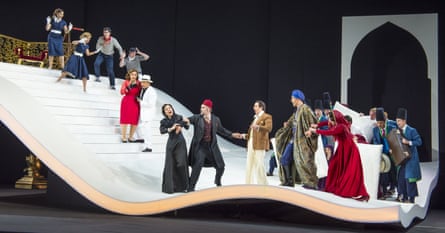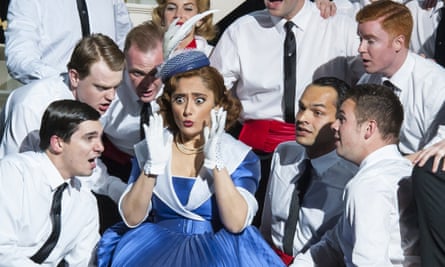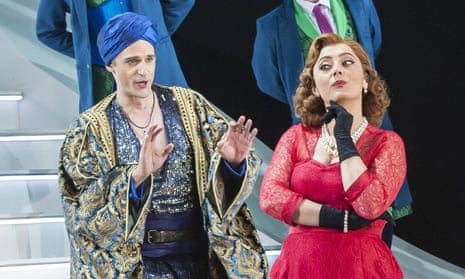“Whether gentle or rough, men are all the same,” we’re told in L’Italiana in Algeri, Rossini’s culture-clash comedy of sexual mores, given a new production by Garsington Opera, directed by Will Tuckett and conducted by David Parry. Rossini was only 21 when he wrote it. It was one of the works that put him on the map at its 1813 Venice premiere, and it’s easy to understand why. The score is often breathtaking, and the first act finale, with its flawless criss-crossing counterpoint, is one of the great moments in opera.
Yet the work also has its tricky side. Rossini celebrates Italian girl power in his heroine, the gloriously unflappable Isabella, who arrives in Ottoman Algiers, with her admirer Taddeo in tow, to look for her lover Lindoro, who has been captured by the bey, Mustafà. Bored with his wife Elvira, the bey soon wants to install Isabella in his harem, but rapidly comes to realise he has bitten off more than he can chew. As Tuckett and Parry point out, there’s a danger of the opera becoming becoming racist when Mustafà is traditionally played as “some terrible blustering old idiot who’s not even remotely attractive”.

Dancer-choreographer-director Tuckett has consequently rethought it in terms of retro movie glamour. Quirijn de Lang’s blinged-up Mustafà, handsome if thick, looks like Rudolph Valentino, and presides over a palace of sweeping staircases out of something by Busby Berkeley. Isabella, Turkish soprano Ezgi Kutlu, is described in the programme as “a sort of 19th-century Sophia Loren, determined to get back her man,” though in her dark glasses and New Look frocks, we’re more reminded of Ava Gardner. Luciano Botelho’s Lindoro wears a Marcello Mastroianni-style white suit. Riccardo Novaro’s Taddeo, dapper and prissy, is pitched somewhere between Cary Grant and Rex Harrison.
The best of it is very entertaining in a surreal, camp way. Eunuchs in fezzes, corsets and sandals do natty routines. Kutlu sings Per Lui Che Adoro as a star in a follow spot, while the men flap about her like besotted fans. But it goes over the top in the second half, where the piece itself slides towards an episodic mix of commedia dell’arte and farce. Tuckett sends up the final 30 minutes something rotten: they would actually be more pointed, and indeed funnier, played relatively straight.

Musically, there are some problems, too. Botelho sounded very pushed in his upper registers on opening night, while De Lang, though mesmerising, took time to settle, his coloratura not always flowing comfortably in the opening scenes. Novaro is impeccably stylish, but it’s Kutlu who is the real find: this is a wonderful voice, dark in tone and evenly produced, her coloratura effortless and thrillingly negotiated. As Elvira, Mary Bevan blazed her way through the role with terrific panache. Parry nicely judges the score’s mix of lyricism and hard-edged wit. And that great first act finale is clockwork in its precision.
- In rep at Wormsley Estate, Stokenchurch, Buckinghamshire until 10 July. Box office: 01865 361636.

Comments (…)
Sign in or create your Guardian account to join the discussion